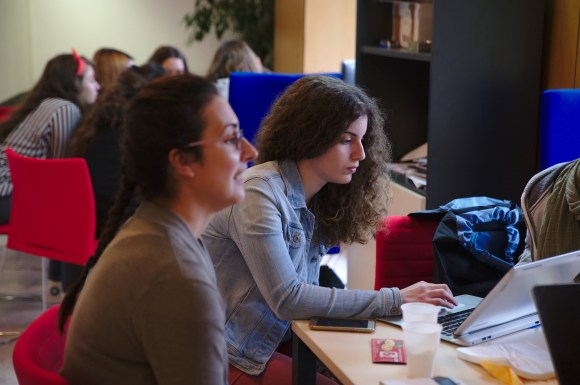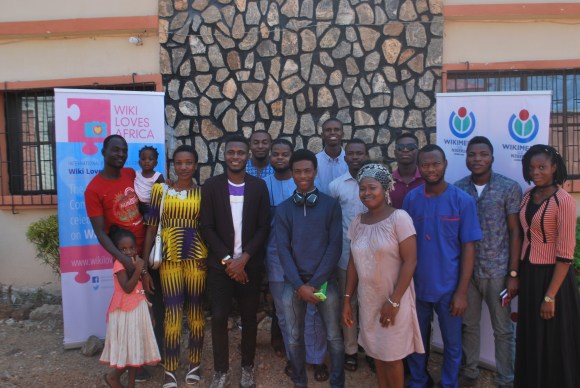
WikiFemHack was a one-day event in October held to explore and address the gender gap and gender bias on Wikipedia issues.
Organised by Wikimedia User Group Greece—in collaboration with SheSharp, a female-oriented IT group, and the Open Knowledge Foundation of Greece—the event focused on finding the roots of these serious issues and coming up with ways to mitigate them.
The main goal was to welcome women, inform them and increase their participation in the technological and programming fields, in addition to Wikipedia.
During the event, the audience was divided into two room. In the first, talks from Greek and international researchers about Wikipedia’s gender gap were held. Speakers informed the participants about community projects that women can join to help boost gender diversity, like Thesswiki, Wiki Loves Women, WikiWomenCamp, Women in Red, and others.
Simultaneously, the second room’s audience attended an editathon (editing workshop) on the Greek Wikipedia and a hackathon, where community programmers and volunteers were there to support the participants. The editathon aimed at creating and translating female profiles using information from Wikidata and other sources. The hackathon was more of an introductory developing session where the participants were given certain programming tasks in Python with an open part with API and PHP.
At the closing of WikiFemHack, we gave out awards to the participants with the best contributions including a laptop, an Arduino kit, a usb stick, free tickets to for Voxxed Days Thessaloniki and more. Near the end of the event, results from the Why Women Don’t Edit Wikipedia research about the gender gap in Greece were presented.
WikiFemHack was targeted to designers, scientists, educators, undergraduate and graduate students with near zero experience in similar projects. The goal was to inform the participants and for them to exchange views so we could, through conversation, take a step towards mitigating the Gender Gap in Technology.
Some of the attendees did not even know they could edit Wikipedia, so taking the time to explain the projects that were presented in an informal fashion helped everyone to get a better grasp of the talks that were hosted.
Everyone had the chance to learn about the policies and code behind Wikipedia and the other Wikimedia projects, enrich the Greek Wikipedia with content and also use their coding skills.
WikiFemHack was free to attend, and the organizers provided support throughout the event and follow-up emails were sent later to help keep them posted with community updates.
The general feedback was highly positive and the event is most likely to be repeated next year. WikiFemHack was based on the positive experience we had in ThessHack and a gender gap editathon organized by the user group in 2016.
Marios Magioladitis, Wikimedia Community User Group Greece
In brief

Wikimedia community in Nigeria hosts Wiki Loves Africa workshop in Ilorin: On 20 and 25 November, the Ilorin Wikimedia Hub organized Wiki Loves Africa 2017 workshops and uploading sessions in Ilorin. This workshop marks the first time ever that any Wikimedia event has been held in Ilorin, the state capital of Kwara and one of the largest cities in Nigeria. More about the event and the Ilorin community is on Meta.
Music Museum of Barcelona uses Wikipedia to guide their exhibition audience: The museum is holding an exhibition to celebrate 22 recently-donated Korean instruments. “Every time we prepare for an exhibition, we analyze in parallel what content we have in Catalan Wikipedia, and what’s in other languages,” says Sara Guasteví, documentalist in the Music Museum of Barcelona in a blog post. “In a particular case, in the exhibition of Musical Sculptures, we [used Wikipedia content about the sculptures] as a part of the text for the exhibition. Since then, we have been collaborating with Amical Wikimedia and Catalan Wikimedians, and allow them to access the information generated by the museum, specialized bibliography from the museum library, and help the Wikipedians to expand or create articles on various topics.”
Wikimania 2018 scholarship committee is looking for volunteers: The Scholarship Committee for Wikimania, the annual conference of the Wikimedia movement, is an important and diverse group of volunteers who help run the Wikimania scholarship program. People from all Wikimedia communities are encouraged to apply for this position. More on the duties and membership criteria on Wikimedia-l.
Registration for Wikimedia Conference 2018 is now open: Registration for the 2018 Wikimedia Conference, which will be held in Berlin from Friday, 20 April, through Sunday, 22 April, is now open. The Wikimedia Conference organizing team is willing to “provide the applicants with important information regarding the eligibility for participation, participant number regulation, registration procedure, specifics in regards to the travel and hotel booking as well as the visa application process,” they wrote in an email to Wikimedia-l where more details are available.
New board for Wikimedia Finland: Wikimedia Finland, the independent chapter that supports the Wikimedia movement in the country have announced their new board for 2018 where three members are keeping their seats from 2017 and two new members are joining.
The WikiChallenge Ecoles d’Afrique kicks in 4 Francophone African countries: The WikiChallenge African Schools is a writing contest held in primary schools in several African countries (Mali, Tunisia, Madagascar, and Guinea). The contest takes place during October and November 2017 with primary school children adding Vikidia articles using the WikiFundi software. More on This Month In Education newsletter.
Samir Elsharbaty, Writer, Communications
Wikimedia Foundation

Can you help us translate this article?
In order for this article to reach as many people as possible we would like your help. Can you translate this article to get the message out?
Start translation